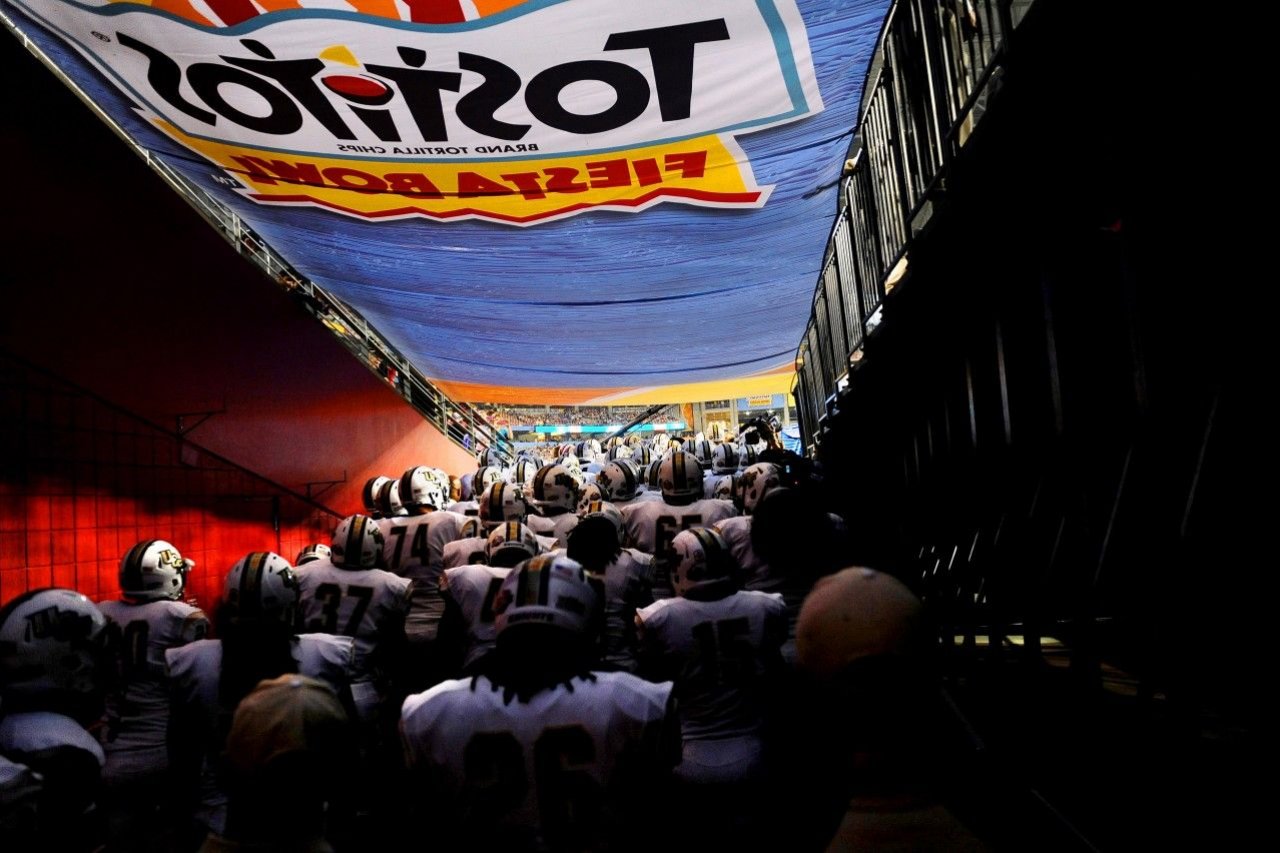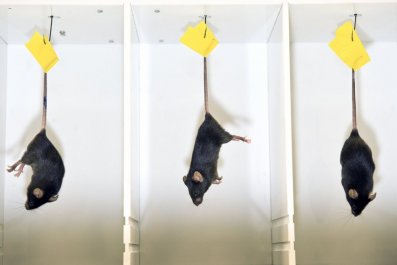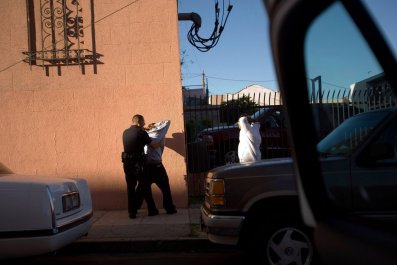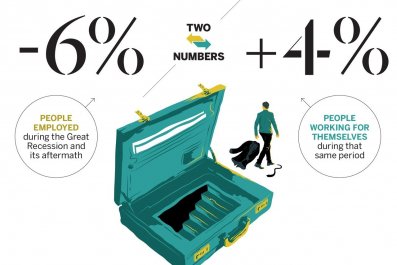Update March 14, 2014: John Junker was sentenced to eight months in federal prison for his role in a campaign contribution scheme
Gone is the familiar canary yellow blazer, his plumage as the Chief Executive Officer of the Fiesta Bowl. In its stead John Junker sports a royal blue apron as he scurries from table to table at the Society of St. Vincent de Paul charitable dining room in central Phoenix.
It is the breakfast hour, 7 a.m. In his hands Junker, now the operations manager at St. Vincent de Paul, totes a red broom and dust bucket as he sweeps in and around the room's 23 circular tables. He is clad in a crisp white shirt and a patterned tie, charcoal gray slacks and Nike running shoes. Occasionally Junker stops to accept handshakes and well-wishes from volunteers, middle-aged men predominantly, who still regard him as a Valley of the Sun colossus, the community pillar whom Sports Illustrated in 2003 dubbed "the seventh most powerful person in college football."
John Junker, 58, was once the highest-paid college football bowl official in the country, drawing a salary of more than $600,000. He now earns $47,000 annually while helping to feed the homeless. He is still in the hospitality business.
"Saint John," a few of his former Fiesta Bowl associates refer to their defrocked boss disparagingly, wondering if his current humble station is part of an act. On March 13, 2012, Junker, who had been the sultan of the Fiesta Bowl since 1990, first as its Executive Director and later as its CEO, pleaded guilty in U.S. District Court to a single federal felony conspiracy charge for his role in an illegal campaign-finance scheme.
On Thursday, exactly two years to the day and after several sentencing delays, U.S. District Judge David Campbell will sentence Junker to anywhere from probation to 2 ½ years in prison in accordance with a plea deal. The U.S. Attorney's Office has recommended one year in federal prison. One week later, on March 20, Maricopa County Judge Joe Welty will sentence him on a related state felony charge that also has a ceiling of 2 ½ years, a sentence that would run concurrently with the first one.
Junker and his attorney, Stephen Dichter, have produced 116 letters written by family, friends, former associates and even community leaders such as Jerry Colangelo, the former owner of the Phoenix Suns who is now director of USA Basketball. Almost every epistle pleas for leniency (i.e., no jail time) for Junker, describing a man whose transformation mirrors that of St. Paul's on the road to Damascus.
"I interacted with Mr. Junker in the 2004-2006 time period when I was Maricopa County Manager and Mr. Junker headed the Fiesta Bowl," writes David Smith, who has since become the Chief Operating Officer at St. Vincent de Paul. "The negotiations...were not pleasant, and I came away with a very negative opinion of Mr. Junker... Mr. Junker is now a direct report to me. Recently I gave [him] our highest rating in our evaluation system. I have done personnel evaluations for 43 years. All I can say is that Mr. Junker is a changed person from the 'full of himself' person in 2006."
Legally, Junker is guilty of coercing 11 employees at the Fiesta Bowl to donate money to various political campaigns and then reimbursing them via Fiesta Bowl coffers.
Symbolically, Junker, who used the eight-figure endowment of the Fiesta Bowl, technically a non-profit, as a means to belong to four private golf clubs in three different states and a non-salaried allowance of approximately $1,300 per day for a period of approximately 10 years (and that's just the tip of the perks iceberg), became the face of hubris and corruption that sports media and the public had long suspected was rampant in the stacked-deck ecosystem of the Bowl Championship Series (BCS).
"John Junker?" says Dan Wetzel, who along with Josh Peter and Jeff Passan wrote Death To The BCS: The Definitive Case Against the Bowl Championship Series. "When we printed our updated edition, we dedicated the second book to Junker for proving the first book correct."
In March of 2011, a Special Committee formed by the Fiesta Bowl debriefed 52 individuals and ultimately produced a scathing 276-page report detailing Junker's myriad abuses of power as Fiesta Bowl kingpin. The list is far too long to enumerate here, but some of the more profligate abuses include a $95,000 expenditure for a round of golf with Jack Nicklaus (Junker did not play); $33,000 for Junker's 50th birthday gala in Pebble Beach, Calif.; $65,000 to fly state legislators and their families to a Boston College-Virginia Tech game in 2008; $13,000 for airfare and other considerations for the wedding of his executive assistant, Kelly Keogh; and $1,241 for a visit to Bourbon Street Circus, a high-end Phoenix strip club, in 2008.
"We are in the business where big, strong athletes are known to attend these types of establishments," Junker famously told investigators. "It was important for us to visit and we certainly conducted business."
A Desert Fiefdom
The choirboy/Caligula dichotomy has long been an integral aspect of the John Junker enigma. The fifth of eight children, Junker, who declined to be interviewed for this story, is a 1973 graduate of Gerard Catholic High School in Phoenix. In his youth, he played the organ during Sunday mass at the Arizona State Hospital for the mentally impaired. Upon graduating Arizona State University in 1977, Junker worked in the school's sports information office before leaving to work for the Fiesta Bowl in 1980.
One day Junker's mother was driving past the Fiesta Bowl's then-modest headquarters in a small office complex on Thomas Road in Phoenix. There, out front, was her son scaling a ladder in order to plant a Fiesta Bowl flag atop the building. "We sent that boy to ASU to learn how to climb ladders?" Junker's mother asked her husband.
Over the next three decades Junker, the Fiesta Bowl, which had launched in 1971, and the Phoenix metropolitan area would all scale unforeseen heights on the national sports landscape. The Fiesta Bowl, once a sleepy Christmas Day afterthought played at a one-tiered stadium in Tempe, hosted its first de facto national championship on January 2, 1987 (the Miami-Penn State classic). It has since hosted six more national championship games -and is now based at state-of-the-art University of Phoenix Stadium. It became one of the four bowls in the BCS rotation, nosing out the more established Cotton Bowl. No single person was more responsible for usurping the Cotton Bowl's prestige than the charming, self-effacing and extroverted Junker.
In 1960, when Junker was four years old, Phoenix was not amongst the top 20 largest metropolitan areas in the United States and was home to no major sports teams. Today, it ranks sixth in size, with four major professional sports franchises, literally half of Major League Baseball's 30 teams making it their spring training base, and the Fiesta Bowl.
In 1980 Junker, then 24, joined the Fiesta Bowl staff and quickly learned the art of socializing with players, coaches and media who found the Valley's climate and social life a gridiron Brigadoon. He can be seen in one photo, drink in hand, schmoozing with a collegians John Elway and Jim McMahon.
Three decades later, Junker was earning north of $600,000 per year and the Fiesta Bowl, with dozens of staffers and hundreds of year-round volunteers, was its own fiefdom. At some point along the way, as the 276-page report suggests, Junker stopped working for the Fiesta Bowl and the Fiesta Bowl started working for him.
"John Junker was earning $600,000 a year," says Wetzel, "and yet he had a $2,500-per-month automobile allowance. What was he driving: a Manhattan townhouse?"
In November of 2009 Craig Harris, a business reporter at The Arizona Republic, was investigating a story on Fiesta Bowl largesse. Harris was reviewing the bowl's 990 tax forms, the financial statements non-profits are required to submit to the IRS, and noticed some peculiarities.
He returned to his desk one day to see the red light on his phone flashing. He had a message. "I work for the Fiesta Bowl. We wrote personal checks for political campaigns. You should look into it." Click.
Harris located one independent source to verify the claim, then another. He spent weeks putting together spread sheets, matching campaign donations made to Arizona politicians over the previous decade with Fiesta Bowl employees past and present. An executive assistant, for instance, who had made a $1,000 donation to a local legislator.
"I don't know what kind of money you earn," says Harris, "but I don't donate $1,000 to political campaigns and I doubt a secretary at the Fiesta Bowl could afford to, either."
On December 18, 2009, Harris' story, "Fiesta Bowl employees say bowl repaid political contributions," ran above the fold. Junker categorically denied all allegations. At the time the Fiesta Bowl was searching for a new head of media relations. Shawn Schoeffler, who had long held that position and was considered by many to be Junker's right-hand man, had been sacked (Schoeffler ultimately was one of six Fiesta Bowl employees who would plead guilty for his role in the campaign finance conspiracy; he would serve one year of probation and pay a $4,600 fine).
On February 14, 2011 -Arizona's 99th anniversary of statehood-Junker was placed on administrative leave. Six weeks later, after the 276-page report was released, he was fired.
Junker has paid $62,500 in restitution to the Fiesta Bowl, but his hubris and dishonesty has left a debt that may be impossible to repay in a lifetime. While Junker was steadily giving himself and other executives profligate raises -his chief operating officer, Natalie Wisnieski, earned $270,000 annually, despite not even having an MBA-and enjoying lavish perks of the job, the Fiesta Bowl was requiring volunteers to ante up $20 fees to cover the cost of outfitting them.
"Why would John Junker even risk his career to donate sums to local politicians?" asks Wetzel. "What legislator in Phoenix is anti-Fiesta Bowl?"
Why Junker has never been indicted for his numerous documented misuses of Fiesta Bowl funds is a stickier question. "That's the million-dollar question," says Harris, who along with others suggests that the state of Arizona may not be prepared to grapple with all the cockroaches that would scurry out once that floorboard was lifted.
Bullet-Proof Windows
In 2011, Junker went to work at the Society of St. Vincent de Paul, an organization where he had been a volunteer the previous decade. In his first year there, according to his attorney, Stephen Dichter, he put in 1,500 to 2,000 hours, exclusively on a volunteer basis. In 2012 Junker was put on full-time staff and his wife, Susan, was also put on paid staff as a development officer.
"John has turned down several raises since he started working there," says Dichter. "We felt that it was important to do that, with him serving his... penance."
The John Junker who feeds the homeless avoids eye contact with people he once called friends, and is the epitome of the humble servant. He looks like a changed and contrite man.
Among the reams of letters written on Junker's behalf, one sentence, written by high school friend Robert F. Boyle, stands out: "Anything John did was for the good of the Fiesta Bowl."





















